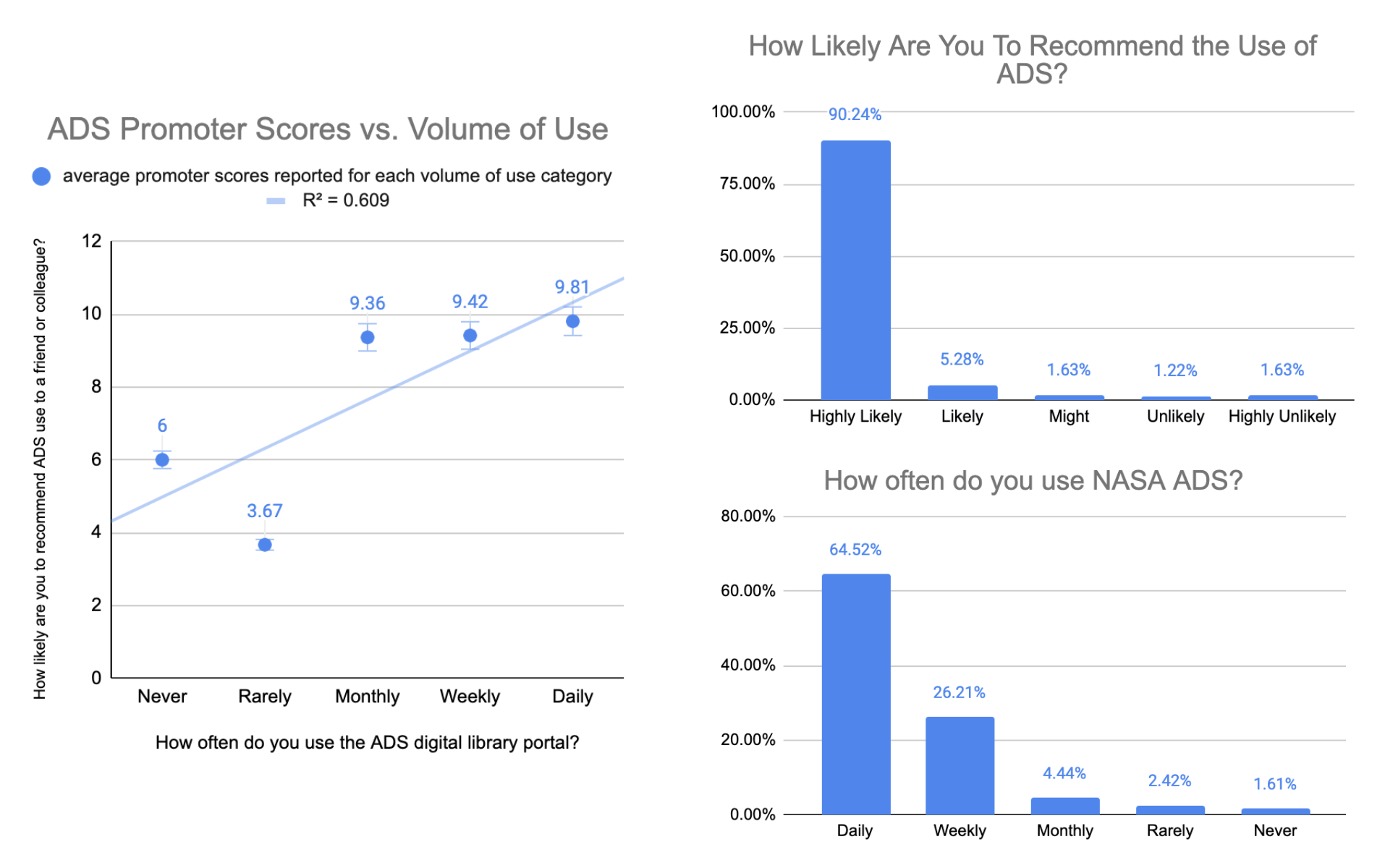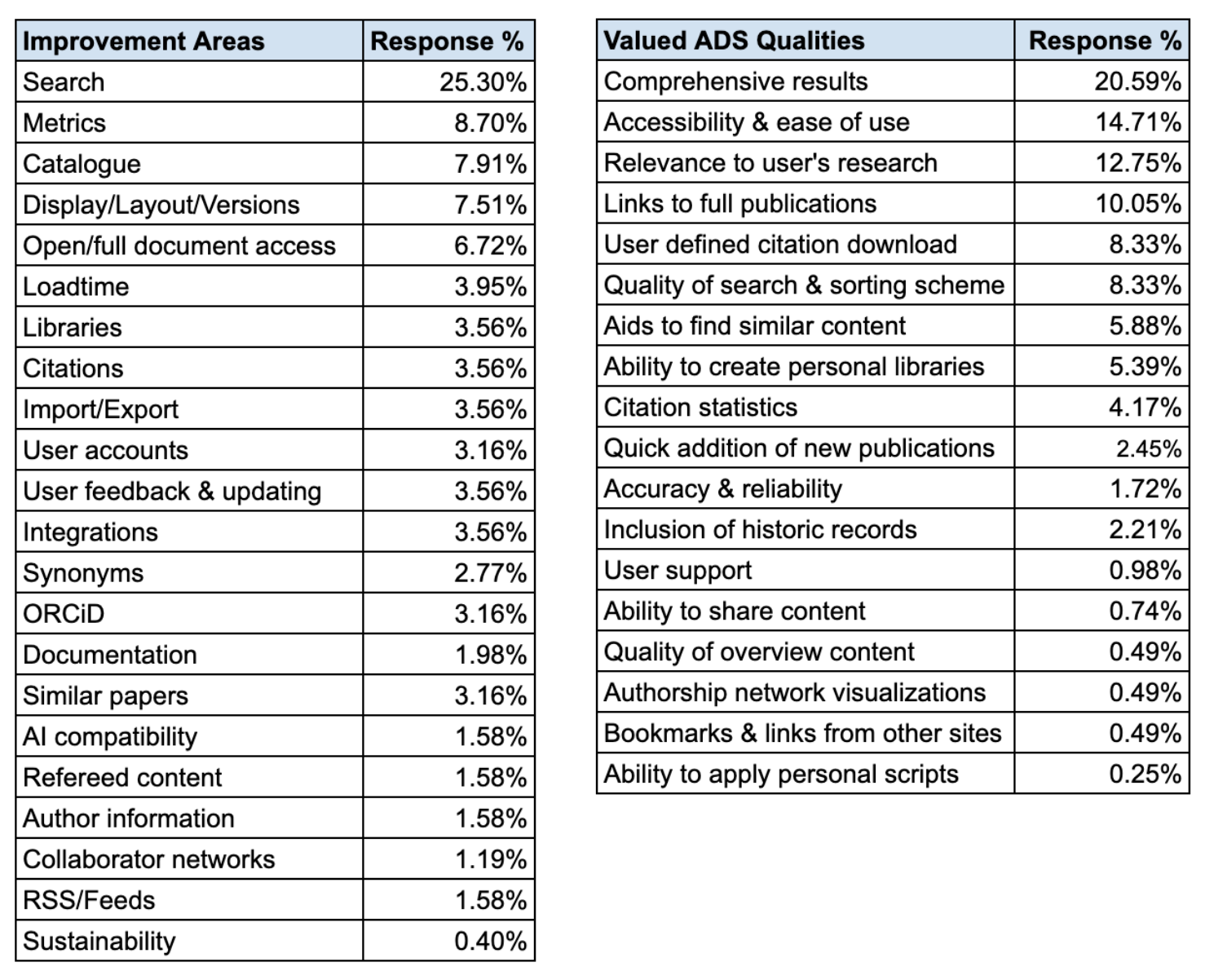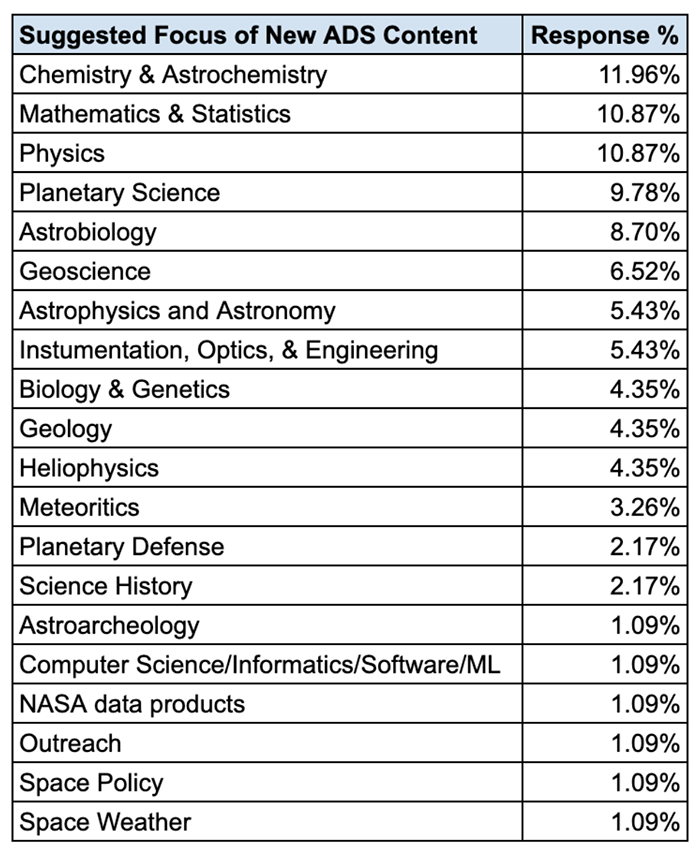Informed Transformation: User Feedback’s Role in the ADS to SciX Transition
Brit Myers (SciX Community Engagement Consultant)
26 Feb 2024
The virtual gathering of the Astrophysics Data System Users Group (ADSUG) on 16-17 November served as a pivotal moment in our ongoing transition from the Astrophysics Data System (ADS) to the Science Explorer (SciX). A crucial precursor to this meeting was a user survey, offering a comprehensive view of the user community’s perceptions, expectations, and concerns from the 248 survey respondents.
The ADSUG meeting delved into these user insights, providing a collaborative space for discussions on maximizing the scientific productivity of the community we serve. The meeting’s agenda included recommendations for changes and improvements to services and procedures, reflecting the ADSUG’s advisory role.
User Survey: Illuminating Current ADS Strengths & User Aspirations for SciX
The survey underscored the significance of ADS in the astrophysics community, with 91.4% of survey respondents reporting daily or weekly use of the system and 95.52% indicating they were either highly likely or likely to recommend the use of ADS to others. A high volume of use and high promoter scores (10 being the highest) were typically reported together. The survey was advertised on the ADS website, through social media, and distributed though newsletters and other online community forums relevant to the SciX expansion. Notably, 56.7% of responses came from existing ADS users who found the survey through a link on the ADS website homepage.
 Figures 1-3: ADS users who reported a high volume of use were also likely to be highly likely or likely to recommend the use of ADS to others.
Figures 1-3: ADS users who reported a high volume of use were also likely to be highly likely or likely to recommend the use of ADS to others.
Users praised ADS for its role as a unified hub, seamlessly integrating published and pre-print content, open-access materials, data, and references. The user-friendly features, such as the absence of cost and the ability to use a home institution’s resources seamlessly, added to the positive narrative. The focus on astronomy content and efficient search capabilities received accolades, emphasizing the importance of accessibility and precision.
Users are eager for enhancements across various aspects of the ADS platform, with a notable interest in improved search functionality. They seek additional search capabilities, like searching by specific criteria such as author name placement, paper length, or details related to astronomical objects, to make searching more efficient and targeted.

Figures 4 & 5: % of user survey responses requesting improvements or innovations to different ADS components as well as the % of responses citing specific features as highly valuable features of ADS.
Performance and usability are also key areas for improvement, with emphasis on faster website loading times, a user-friendly interface design, and consistency in site layout. These enhancements are crucial for ensuring a seamless and enjoyable browsing experience for all users.
Citation and bibliographic management are areas where users have requested ongoing attention, including better extraction of citation information and integration with popular citation management tools. These improvements aim to streamline managing citations and organizing research libraries, saving researchers valuable time and effort.
Content and data access are important to users, who express the need for access to additional full texts outside the ADS platform, integration with other databases, and improved linkage to datasets associated with papers. Enhanced integration of datasets linked to papers would facilitate reproducibility and further research, essential for scientific inquiry.
Personalization and user accounts are also areas of interest, with users suggesting improvements, such as the ability to save searches and queries, improved API documentation, and organizational features for personal libraries. These enhancements aim to help users manage their research more effectively and stay updated with the latest developments in their field.
Metrics and impact measurement are important considerations, with suggestions for incorporating new metrics like citation rate and read count rate. Improved bibliometric tools could provide valuable insights into the scholarly landscape, helping researchers assess the significance of their work and track its impact over time.
Integration and external links also present opportunities for improvement, with users expressing the need for new integrations with a variety of external resources and academic platforms. These enhancements would enable seamless access to additional research sources and citations, enhancing the overall research experience.
The survey results also highlighted a collective eagerness of ADS users to explore new scientific territories. Users desire interdisciplinary connections, with a focus on mathematical and statistical content, chemistry, astrobiology, physics, and other fields beyond the traditional scope of astrophysics. The ADSUG meeting served as a platform for delving deeper into these aspirations as well as the many diverse suggestions submitted by users to enhance the portal’s existing capabilities.

Figure 6: % of user survey responses requesting expansion of ADS & SciX to include additional content in these subject areas.
Addressing User Concerns
While users expressed their hopes for SciX, they also shared concerns about potential challenges during the transition. The ADS team, as outlined in discussions during the ADSUG meeting, committed to a transparent and collaborative approach. We will maintain existing functionalities, ensuring a seamless transition for users. Discussions during the meeting revolved around strategies to address user concerns and maintain a user-centric approach throughout the transition process.
Specific questions from users, raised in the survey, became focal points of discussion at the ADSUG meeting. Participants scrutinized topics such as changes to the ADS application programming interface (API), alterations to search functionality, and the potential dilution of search results, emphasizing the collaborative efforts between the ADS team and the user community to navigate the forthcoming changes successfully. Attendees also discussed the ongoing importance of communication and thorough outreach efforts.
Conference Outreach & Engagement
In response to the ADUG’s emphasis on outreach, the ADS team initiated outreach interactions with both established and new users during the American Geophysical Union Fall Meeting and the American Astrophysical Society Meetings #243. These conferences provided valuable opportunities for us to connect with the broader scientific community, offering insights and perspectives that further inform the SciX transition.
The bullet points below encapsulate direct responses to the inquiries raised by the community during the ADS team’s conference interactions.
- ADS Is NOT Going Away: While transitioning to SciX, ADS will remain accessible in its current format, preserving familiarity and ensuring uninterrupted access for users.
- ADS Support Will Continue: The ADS team reaffirms its commitment to user assistance and assures users of continued support during the transition. We will be a reliable resource for both existing ADS users and new SciX users.
- Astrophysics Remains a Core Focus: The astrophysics focus within SciX aligns with ADS’s original purpose. Services initially designed for astrophysics are, and will continue to be, a firm foundation for the development of similar services for other scientific disciplines.
- Innovative & Intuitive SciX Search: The user-friendly, discipline-specific search features planned for SciX aim to enhance the search experience, catering to users’ specific interests with precision.
- Interdisciplinary Insights: NASA’s charge that SciX facilitate interdisciplinary exploration matches with user aspirations, ensuring a seamless integration of relevant data from various scientific fields.
- Informatics Innovation: SciX inherits from ADS the aim of innovation in informatics innovation, which will ensure that SciX evolves dynamically, introducing new features and tools to enhance the overall user experience.
- Expanded Staff Expertise: The ADS team acknowledges the need for added expertise as we transition into SciX, because we remain dedicated to supporting users effectively.
- User Feedback: The ongoing call for user feedback ensures that SciX remains attuned to the diverse needs of the scientific community, including astronomers.
Conclusion: A Collaborative Transition
In conclusion, the shift from ADS to SciX is a collaborative effort between the ADS team and our user community. Shaped by survey insights, ADSUG discussions, conference engagements, and your comments, the SciX team’s user-centric development works to ensure it meets community needs. SciX aims to preserve ADS strengths while pioneering new avenues for science discovery. As the ADS/SciX team looks ahead, your input remains key in shaping the future of SciX. Share your thoughts, insights, and suggestions at help@scixplorer.org.
 astrophysics data system
astrophysics data system